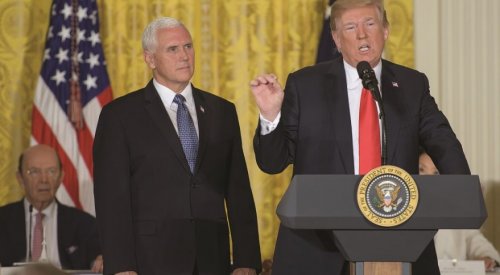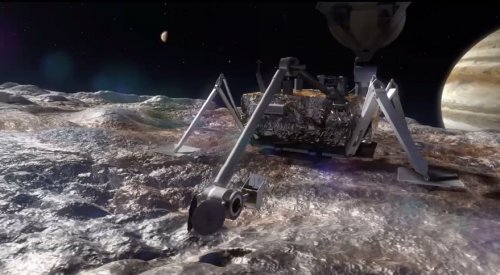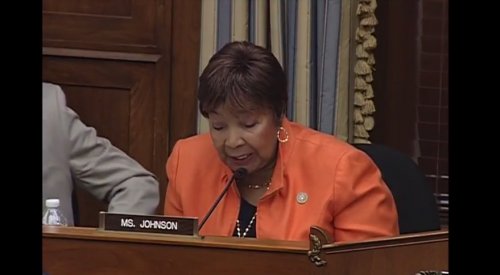WASHINGTON — The Trump administration’s desire to establish a Space Force could be in jeopardy next year after Democrats assume control of the House, while the departure of a key House appropriator could spell trouble for NASA missions to the potentially habitable moon of Europa.
While some races from the Nov. 6 midterms elections have yet to be finalized, including the bid by Sen. Bill Nelson (D-Fla.), ranking member of the Senate Commerce Committee, to win another term, Democrats won a majority of seats in the House, giving it control of committees that will set the legislative agenda for the next two years.
In addition, Rep. John Culberson (R-Texas), chairman of the commerce, justice and science appropriations subcommittee, lost reelection, depriving NASA and space scientists of one of their most powerful patrons.
Space Force
Perhaps the biggest space policy issue the next Congress will have to deal with is the formation of a Space Force. White House and Pentagon officials have said that they plan to seek Congressional approval next year of a plan to establish the Space Force as a separate military branch.
That effort may run into problems in the House, though. The likely next chairman of the House Armed Services Committee (HASC), Rep. Adam Smith (D-Wash), said this fall he was skeptical about the need for a Space Force, particularly given the high cost estimates for creating it developed by the Air Force.
Smith alluded to that in a Nov. 8 letter to colleagues announcing his intent to seek the chairmanship of the committee. “We must look to eliminate inefficiency and waste at the DOD,” he wrote.
Experts were skeptical that the Space Force could win approval. “It’s dimmed the chances that, in its current form, it can make it through Congress,” said Todd Harrison, director of the Aerospace Security Project at the Center for Strategic and International Studies. “It’s much more difficult now.”
There is the possibility, though, of changes falling short of a Space Force. One possibility is the development of a Space Corps within the U.S. Air Force, something that the House backed in 2017, prior to the administration’s Space Force plans. “There is room for compromise,” Harrison said, noting that Smith voted in favor of the defense authorization act in the House in 2017 that included Space Corps language.
The challenge may be getting the White House to accept something less than a full-fledged Space Force. “There probably would be bipartisan support for a Space Corps,” said Brian Weeden, director of program planning at the Secure World Foundation. “The question is, will the White House be able to live with that, or will they hold out and demand a Space Force?”
Harrison said a House Armed Services Committee led by Smith may take a stand on another military space issue, how the Air Force funds a follow-on program for the Space-Based Infrared System (SBIRS) missile warning satellites. That effort has been underfunded compared to cost estimates for it, Harrison said, leading to reprogramming requests for additional funding.
“I don’t think the HASC will look at that favorably,” Harrison said. “They will push back on that, and could start denying reprogramming requests.”
Europa and other NASA programs
NASA in general had benefited from having Culberson as chairman. On many occasions, Culberson remarked about the need to increase NASA’s budget, and he was able to follow through with funding well above administration requests. The fiscal year 2019 spending bill approved by House appropriators in May offered more than $21.5 billion for NASA, more than $1.6 billion above the agency’s original proposal.
That bill “continues NASA’s record-level funding, setting the agency on the trajectory to rise above and beyond the glory days of Apollo,” Culberson said at a markup of the bill.
No program has benefited more from his largess than proposals to send missions to Europa, the icy moon of Jupiter with a subsurface ocean of liquid water that makes it potentially habitable. For several years he provided funding well above any NASA request for a mission now called Europa Clipper, which will enter orbit around Jupiter and make dozens of flybys of Europa to study the moon in detail.
More recently, he started providing funding for a follow-on lander that would touch down on the moon’s icy surface and sample it to look for evidence of life. In that 2019 spending bill, he provided $545 million for Europa Clipper mission and $195 million for the lander. NASA had sought $264.7 million for Europa Clipper and nothing for the lander. That funding called for launching Europa Clipper in 2022 on a Space Launch System and the lander as soon as 2024.
With Culberson gone, that funding stream is in jeopardy. Casey Dreier, senior space policy adviser for The Planetary Society, said he thought Europa Clipper would likely muddle through, given that the mission is well into development — it recently passed a set of preliminary design reviews — and has support in the scientific community. A Europa mission ranked second in the 2011 planetary science decadal survey for flagship-class missions behind a Mars sample-caching rover that became Mars 2020. Its launch, though, might slip until later in the 2020s.
A Europa lander, though, was not included in that list of potential flagship missions and is still in the early stages of development. “I have a hard time seeing how the Europa lander project continues without Culberson, because NASA has not formally requested the mission, and it lacks consensus support from the scientific community,” Dreier said.
At a meeting of NASA’s Outer Planets Assessment Group in September, scientists worried about the dependence of relying on a single benefactor, Culberson, for the Europa missions. “The issue for the lander is that congressional support is coming from a single point,” said Louise Prockter, director of the Lunar and Planetary Institute. “We don’t like single-point failures in our missions, and I don’t think it’s a good idea to have them in our programs either.”
NASA may face more general budget pressures as well, ranging from a need for an estimated half a billion dollars to cover cost overruns and delays in the James Webb Space Telescope to a request by President Trump for federal agencies to cut spending by five percent next year. Harrison noted NASA will go into that environment in a more vulnerable state without Culberson to defend it.
Culberson’s departure, though, could have benefits in civil space policy. Culberson had continued the practice started by his predecessor as subcommittee chair, Rep. Frank Wolf (R-Va.), of including provisions in spending bills restricting NASA’s ability to cooperate with China. While the restriction is not an absolute ban, it does make it much harder for NASA to work with its Chinese counterparts, effectively restricting it to largely non-controversial areas like aviation and Earth science.
With Culberson gone and the appropriations committee now in Democratic hands, that provision could be altered in future bills. “I think there is a chance that language might get softened or possibly even go away,” Weeden said. That doesn’t mean, he added, that the U.S. and China will immediately start cooperating in human spaceflight, but could enable more scientific cooperation, something both NASA and Chinese officials have said they are interested in.
Commercial space policy
The change in House control might be least disruptive in commercial space policy issues, where some expect a continuation of bipartisan support on those topics.
“Commercial space got a lot of support from Bart Gordon when he chaired the House Science Committee, and hopefully Eddie Bernice Johnson will continue in that tradition,” said Jim Muncy, president of PoliSpace. Johnson (D-Texas), the current ranking member of the committee, announced her intent election night to seek the chairmanship of the committee, but didn’t explicitly address space issues in her agenda.
“The broad bipartisan support for the first three Space Policy Directives will hopefully continue regarding NASA’s lunar initiatives, important reforms at the FAA’s Office of Commercial Space Transportation and Commerce’s growing role in space,” Muncy said.
The change in party control, though, could affect how new commercial space responsibilities are assigned. Johnson opposed a bill introduced by Republican members of the committee in June that would give space traffic management responsibilities to the Commerce Department, as the administration proposed in Space Policy Directive 3.
“I do not support our committee rubber-stamping the half-baked efforts of the Trump administration to address the issue,” she said, noting that previous studies had looked at moving that responsibility to the FAA, rather than Commerce. “In fact, no credible reason has been articulated for why the Commerce Department is the best place to house the function.” An amendment she offered to instead perform a one-year study on who should handle space traffic management was defeated, largely on party lines.
With Johnson now running the committee, it may revisit that issue, including whether space traffic management belongs with the FAA. That could put it line with the Republican-controlled Senate, which has also proposed giving that work to the FAA.
“I think there is a possibility that you might see bipartisan agreement between the Democratic-controlled House and the Republican-controlled Senate on giving these authorities and resources to the Department of Transportation,” the cabinet agency FAA is part of, Weeden said.
As with the Space Force, Weeden said the issue will be whether the White House would be willing to go along with giving the FAA space traffic management responsibilities, or if it will stick with its plan in SPD-3 to give that to Commerce. “If they do stick to their guns on that,” he said of the White House, “my guess is that we’re not going to see anything happen until 2020.”
- Space Force discussions increasingly blur the line between military and civilian space
- SN Military.Space | Who’s who in the national security space workforce • Doubts raised about cost of Space Force • U.S., Brazil to share space data
- SN Military.Space | Space Force a political football • The next big thing in space missile defense • How to make satellites ‘defendable’
- Why Sierra Nevada’s owners are betting big on Dream Chaser
- SpaceX takes top honors in SpaceNews Awards for Excellence & Innovation
Share with your friends



(0) Comments
This article comments are currently no :(